 Website:
Konica Minolta Sensing Americas
Website:
Konica Minolta Sensing Americas
Group: Konica Minolta
Catalog excerpts

ISP Series Integrating spheres for all applications We bring quality to light.
Open the catalog to page 1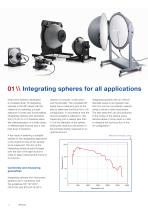
01 \\ Integrating spheres for all applications A key issue in selecting a suitable sphere for the designated application is the maximum size of the sample to be measured. The size of the integrating sphere should increase with the size of the light source in order to keep measurement errors to a minimum. Conformity and measuring geometries Integrating spheres from Instrument Systems are in conformity with the guidelines CIE 127:2007, CIE S 025 and IES LM-79-08 in respect of concept, construction and functionality. The complete ISP series has a measuring port at the side to determine...
Open the catalog to page 2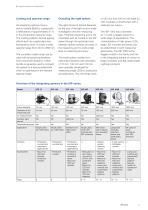
Integrating spheres for all applications Coating and spectral range Choosing the right sphere All integrating spheres have a barium sulfate (BaSO4) coating with a reflectance of approximately 97 % in the photometric spectral range. The coating exhibits minimal ageing effects and has a particularly low fluorescence level. It covers a wide spectral range from 240 to 2600 nm. The right choice of sphere depends on the size of the light source under investigation and the measuring task. Potential measuring errors are minimized with all models in the ISP series through the optimized ratio between...
Open the catalog to page 3
Guidelines for selecting the correct size y 4 π geometry The total surface of the test sample should be smaller than 2 % of the surface of the sphere. The length of a linear lamp should be less than 2/3 of the diameter of the sphere. y geometry 2π The diameter of the measuring port and hence the maximum extension of the test specimen should not exceed 1/3 of the sphere diameter. 02 \\ Equipment and mode of functioning The working principle The sphere factor M(ρ) specifies how much the throughput of the Using integrating spheres to determine integrating sphere varies as a the radiant power...
Open the catalog to page 4
Equipment and mode of functioning Self-absorption correction The test object itself contributes to the absorption of light radiation in the integrating sphere. This form of interference known as self-absorption can result in a significant attenuation of light radiation and leads to deviations in measurement. This attenuation becomes more pronounced as the test specimen becomes bigger and darker. A self- bsorption correction a with the assistance of a suitable auxiliary light source is therefore essential for precise measurements. A halogen lamp covering a wide spectral range is typically...
Open the catalog to page 5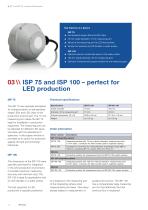
Key features at a glance ISP 75 y For standard single LEDs and LED chips y 75 mm inside diameter, 15 mm measuring port y Mount at the measuring port for LED test sockets y Version for assembly at LED handler or wafer prober ISP 100 y Optimum size for constricted space in the wafer prober y 100 mm inside diameter, 33 mm measuring port y Optional: Protective silica glass window for the measuring port Technical specifications The ISP 75 was specially developed for characterization of standardized single LEDs and LED chips in the production environment. The 15 mm measuring port makes the ISP 75...
Open the catalog to page 6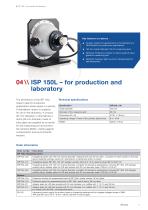
Key features at a glance y Turnkey system for applications in the laboratory or OEM version for production applications y 150 mm inside diameter, 50 mm measuring port y Optional: Protective window or dome made of silica glass for measuring port y Optional: Auxiliary light source to compensate for self-absorption 04 \\ SP 150L – for production and I laboratory The dimensions of the ISP 150L make it ideal for production applications where space is a priority. A standalone version is supplied for use in the laboratory. A window (35 mm diameter) or alternatively a dome (36 mm diameter) made of...
Open the catalog to page 7
Key features at a glance y Ideal for all single LEDs, high-power LEDs and small LED modules y 250 mm inside diameter, 75 mm measuring port y Holder for LED test sockets and TEC test adapters y Integrated auxiliary light source to compensate for self-absorption 05 \\ SP 250 – great for high-power I LEDs The ISP 250 is ideal for characterization of single LEDs, high-power LEDs and small LED clusters and modules. The diameter of 250 mm means that it provides an ideal compromise between size and precision for these applications. The ISP 250 has a default integrated 10 W auxiliary halogen light...
Open the catalog to page 8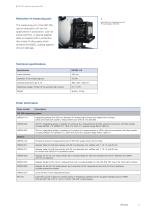
ISP 250 – great for high-power LEDs Reduction of measuring port Base plate with clamping jaws and TEC test adapter LED-870. The measuring port of the ISP 250 can be reduced to 50 mm for applications in production, such as partial LED flux. A special adapter plate is supplied with a protective disc made of silica glass which protects the BaSO4 coating against dirt and damage. Technical specifications Specification Inside diameter Diameter of the measuring port Operating voltage / Power of the auxiliary light source Order information Order number Integrating sphere with 250 mm diameter; for...
Open the catalog to page 9
Key features at a glance y Universal for all high-power LEDs, mid-sized LED modules and small lamps y 500 mm inside diameter, 150 mm measuring port y Closed and opening version supplied with internal lamp post y Integrated auxiliary light source to compensate for self-absorption 06 \\ SP 500 – for mid-sized LED I modules The ISP 500 has been designed for accurate determination of the radiant power and luminous flux from small lamps, high-power LEDs and mid-sized LED modules. The sphere is supplied in two versions: a closed model for measurements in 2π configuration, where light is only...
Open the catalog to page 10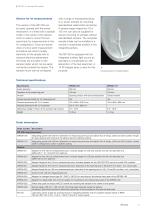
Version for 4π measurements This version of the ISP 500 can be easily opened with the swivel mechanism. It is fitted with a sample holder in the center of the sphere, which is used to mount the test specimens for measurements in the 4π configuration. Force and sense wires of a four-point measurement procedure are used to supply electricity to the sample and to measure electrical parameters. Terminals are provided on the sample holder which can be easily connected outside the sphere. The sample mount can be configured with a range of standardized plugin or screw sockets for mounting...
Open the catalog to page 11All Konica Minolta Sensing Americas catalogs and technical brochures
-
LumiTop Series
16 Pages
-
LumiSuite
8 Pages
-
CAS140D_IR
2 Pages
-
CAS140CT_IR
8 Pages
-
CAS125
4 Pages
-
LumiCam 4000B_2400B_V2
12 Pages
-
DTS 140D NVIS
5 Pages
-
ACS & ACU Series
12 Pages
-
Spectrophotometer CM-36dG
8 Pages
-
LGS 650
8 Pages
-
LumiCam Series
16 Pages
-
CAS 120
8 Pages
-
CAS 140D
16 Pages
-
New GM series gloss
4 Pages
-
Spectrophotometer CM-5
3 Pages
-
SPECTROPHOTOMETER CM-3700A
3 Pages
-
CRI Illuminance Meter CL-70F
2 Pages
-
Chroma Meter CS-150
3 Pages
-
CHROMA METER CS-200
6 Pages
-
Chroma Meter CL-200A
4 Pages
-
2D Color Analyzer CA-2500
8 Pages
-
Skin Analysis Software CM-SA
4 Pages
-
GTI GLE-M
2 Pages
-
GTI MiniMatcher Series
2 Pages
-
Rhopoint TAMS™
6 Pages
-
Rhopoint IQ FLEX 20
2 Pages
-
Uni Gloss 60A/S/CT
4 Pages
-
BC-10 Plus
4 Pages
-
CR-410PB
4 Pages
-
CR-400/410
5 Pages
-
CM-3700A
3 Pages
-
CM-700d/600d
3 Pages
-
cm-25cg
2 Pages
-
cm-m6
2 Pages
-
DTS140 NVIS
6 Pages
-
Rhopoint IQ-S
4 Pages
-
RHOPTOINT instruments
6 Pages
-
LumiCam 2400
4 Pages
-
Medidor de Brillo 268A
4 Pages
-
CM-25cG
4 Pages
-
FD-9
6 Pages
-
RHOPOINT Flex 60 / Flex 20
2 Pages
-
CR-20
2 Pages
-
CR-10 Plus
2 Pages
-
ISP Series Integrating Spheres
17 Pages
-
LCS IV
1 Pages
-
ISP40
4 Pages
-
LGS 1000
4 Pages
-
LGS 350
8 Pages
-
ISP 500
4 Pages
-
ISP 2000
2 Pages
-
ISP 150L
2 Pages
-
ISP 1000
4 Pages
-
LEDGON LED GONIOPHOTOMETER
4 Pages
-
LED-81X/-850
4 Pages
-
ACS-530
4 Pages
-
LED 25
4 Pages
-
LSM 350
4 Pages
-
DTS 500 SPECTRORADIOMETER
8 Pages
-
THE DTS 400 SYSTEM
2 Pages
-
LUMICAM 1300
8 Pages
-
CAS 140CTS
4 Pages
-
MAS 40
8 Pages
-
SPECTRO 320
12 Pages
-
MM-4E CONTROLLED LIGHTING
2 Pages
-
CM-600D SPECTROPHOTOMETER
3 Pages
-
CR-410C Coffee
2 Pages
-
Chlorophyll Meter SPAD-502
2 Pages
-
MULTI GLOSS 268PLUS
2 Pages
-
CM-SA SKIN ANALYSIS SOFTWARE
4 Pages
-
CM-5 SPECTROPHOTOMETER
3 Pages























































































